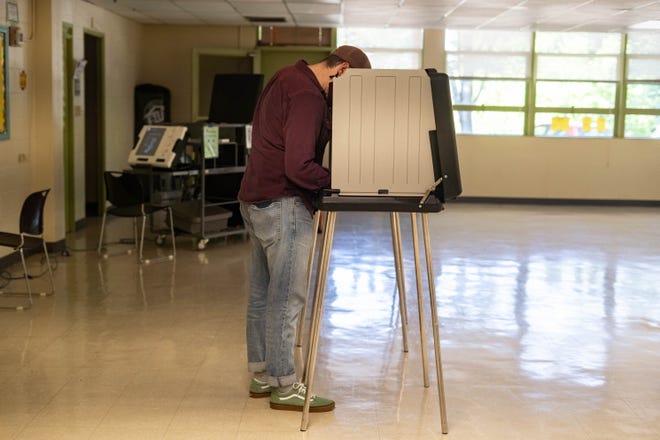In defending new voting restrictions, WNC senator avoids Trump election fraud claims

In making his case for new voter restrictions, a WNC Republican state senator avoided Donald Trump-backed election conspiracies − instead citing home-grown fraud.
North Carolina Sen. Warren Daniel also told the Citizen Times in a July 14 interview that his meeting with a controversial top Trump election lawyer did not affect the language of Senate Bill 747, which he co-sponsored. Daniel, who represents eastern Buncombe, as well as McDowell and Burke Counties, said he believed SB747, the requirements of which include absentee ballot signature verification, would pass by “early fall.”
The bill passed the Senate and now must be approved in the House. Both chambers are controlled by a GOP majority big enough to override Democratic Gov. Roy Cooper’s veto.
Critics say the proposed law panders to false fraud claims and could make North Carolina absentee ballot rules the strictest in the nation. Initial costs for software and implementation have been estimated at $17 million, followed by up to $4 million annually.
“It’s a terrible bill that will make it harder for people to vote, end of story,” said Democratic Sen. Julie Mayfield, who represents western Buncombe. “It caves to many of the conspiracy theories from the 2020 election and makes election administration more difficult without any promise of additional resources.”
Trump in his current presidential campaign has persisted in false election claims, including this month blaming his loss in Nevada on fraud, despite a judge there saying Trump’s case had no credible or reliable evidence. In 2022, the state’s Democratic governor narrowly lost his reelection bid.
Asked by the Citizen Times about the need for the rules despite no proof fraud affected recent elections, Daniel avoided addressing Trump-backed claims, instead pointing to an older, more local case.
“For one thing, I think we’re overlooking the fact that we had a congressional election that was overturned based on ballot harvesting. So, saying there hasn’t been some form of violations is really inaccurate,” the senator said.
That was the 2018 race for the state’s eastern 9th District in which GOP candidate Mark Harris’ apparent win was nullified after evidence of illegal “ballot harvesting.” Harris did not face charges that included collecting incomplete or blank ballots and forging names and votes, but 10 people did. As of last fall, four had pleaded guilty.
SB 747 proposed election restrictions
- Require signature verification on absentee ballots, a form of voting that can be done by mail or handed in. (North Carolina is one of a few states already requiring two witness signatures or a notary public for an absentee ballot.)
- Decrease the amount of time voters have to return absentee ballots, so that they must be received no later than the day of the election. (Current law counts ballots postmarked by the election day.)
- Ban nonprofit grants and other private money from being used to help pay for election administration.
- Require that people using the same-day registration and voting procedure have their ballots set aside and be researched before they can be counted.
Speaking about meeting with Cleta Mitchell, a former top Trump election lawyer, Daniel said he was not aware that she would be part of a group he and other Republican state lawmakers were scheduled to talk to. SB747 was filed after that meeting, on June 1, and did not reflect Mitchell’s input, he said.
“My recollection is, I don’t really know that the bill really changed in regards to that,” he said. In defending the bill, Daniel said it “makes reasonable restrictions,” and that the state would still have “some of the most robust voting opportunities in the country.”
Mitchell has met with GOP state legislators promoting strict voter ID laws and broad allowances for poll observers. She was on the Jan. 2, 2021, call when the then-president urged Georgia officials to “find” more than 11,000 votes for him, enough to flip his loss to Democrat Joe Biden. In the wake of Trump’s actions, the Fulton County DA has said she is on the verge of seeking an indictment, something Trump on July 14 asked a judge to prevent.

Democratic House member Caleb Rudow, who represents northwestern Asheville and Buncombe County, has said there are no good cases for SB747, including the 2018 fraud in the congressional 9th District.
“To be clear, it was election fraud and not voter fraud. It was settled with existing laws. And it didn’t challenge the outcome of any election and didn’t challenge the integrity of the system,” Rudow said.
More:Trump-backed Asheville, WNC House candidate sentenced for federal felony election crime
AG: Mark Meadows won’t face voter fraud charges in North Carolina
Joel Burgess has lived in WNC for more than 20 years, covering politics, government and other news. He’s written award-winning stories on topics ranging from gerrymandering to police use of force. Got a tip? Contact Burgess at jburgess@citizentimes.com, 828-713-1095 or on Twitter @AVLreporter. Please help support this type of journalism with a subscription to the Citizen Times.
This article has been archived for your research. The original version from Citizen Times can be found here.


